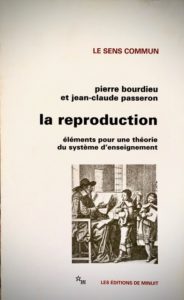ANNIVERSARY PAPER I GAVE AT CONFERENCE TO COMMEMORATE THE 50TH ANNIVERSARY OF THE PUBLICATION OF LA REPRODUCTION BY BOURDIEU IN 1970

The book appeared in English in 1977.
Abstract
This presentation addresses the reception and influence of La Reproduction by Bourdieu and Passeron from the time of its publication in English in 1977. The theme is set in the context of:
- The development of English Sociology as a discipline in the post war period;
- The expansion of teacher education and educational research from the 1960s;
- The establishing of educational ‘foundational disciplines’ and institutional support for them.
- The broader the growth in ‘cultural studies’ as a supporting discipline.
The influence of Reproduction will be considered as part of the so-called ‘new’ Sociology of Education in England; which was announced by the publication of Knowledge and Control in 1971 – an edited volume to which Bourdieu contributed two articles. This book was initially proposed by Bourdieu, along with Basil Bernstein and Michael Young and arose from a Conference in Durham, UK in 1970 to which Bourdieu contributed ‘Cultural Reproduction and Social Reproduction’. The focus of these works on the construction and organization of pedagogic knowledge will be highlighted: both in terms of common themes and differences. The distinctiveness of Bourdieu’s approach will be emphasized; in particular his concept of ‘cultural capital’ and the influence it had within the education community.
The presentation will connect Reproduction with Bourdieu’s earlier work in Algeria and the Béarn to underline important aspects of his work which were badly understood in the 1970s context: philosophical and methodological – ethnographic and statistical. UK-based criticisms of Reproduction of the time will illustrate a range of misunderstandings; for example, the ‘universal’, ‘ethos’, ‘class’, and ‘structure’.
The subsequent growth and character of educational research in the UK will be addressed in terms of the main tenets of Reproduction and contrasted with the direction that Bourdieu’s own research took. Key issues here include:
- Methodological approach: the ethnographic style of UK educational research and that of Bourdieu;
- The presence – and absence – of philosophy;
- The link between theory and practice;
- Impact on teacher education and thus classroom practice;
- Education as part of a broader historical sociology;
- The contrast in the nature of reflexivity.
These issues will be exemplified with reference to influential books of the time: for example, Learning to Labour (1977) and Codes, Class and Control (1971).
The discussion will connect with the relationship between policy and practice and the strategies available for counteracting ‘pedagogic symbolic violence’; for example, the ‘de-schooling’ movement.
The presentation ends with a brief account of the reactionary backlash to this generation of educational researchers: criticism of it and what followed in its wake. This discussion will be connected to the consequences of the misunderstanding and misapplication of Reproduction and what might shape a revised appreciation of its aims and objectives.
Paper: